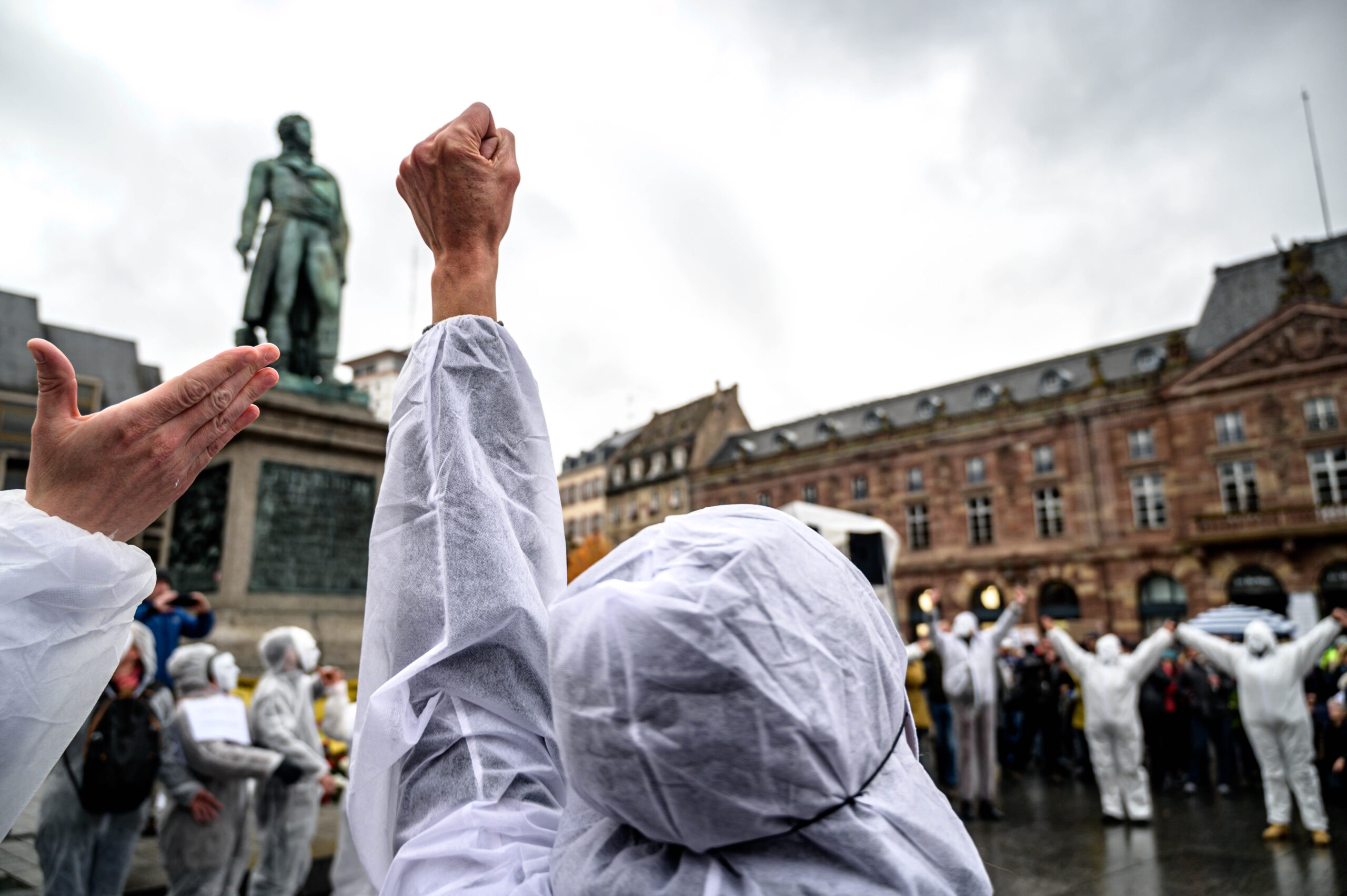Out of the 2,1 million inhabitants of the Brussels province, only 58.3 percent are fully vaccinated, as the latest data from the country’s health organization Sciensano shows. Among the people that have not yet had their vaccination, a particular crowd of anti-vaxxers is growing. Coming from every walk of life, anti-vaxxers have disbelief in the governmental covid policy and in use of vaccines. This is a development that is not only seen in Brussels, but can be seen in many European countries. What drives this group?
The people who don’t want to get a vaccine can be divided into a couple of groups, according to Inge Neven, crisis manager of the Brussels region. “They vary and have many different backgrounds, which is not surprising seeing the origin of the population of Brussels. We have over 180 nationalities”, she says. With 25% of the population who come from a foreign country, it makes for an interesting geographical area.
“We have about 1 on 3 who are living near the poverty line, and also many people don’t have a general practitioner or are facing problems with digitalization and such. We know it is quite difficult to reach them, and that is also what we see in the data. We have the lowest percentage of the vaccination degree of all of the Belgian regions. Lately we have been focusing on decentralized activities such as working with vaccination buses (so called vacci-buses), where people can get their vaccine without an appointment”, Neven adds.
Those vacci-buses are situated in areas such as Molenbeek-Saint-Jean, which is one of Brussels poorest neighbourhoods. Mezdi (27) comes from the area himself and works for the regional government as a neighborhood watch. He is standing in front of the vacci-bus that is located on the square of metro station Étangs Noirs. Contrary to the fact that he is accompanying locals to get their shot, he himself is not yet vaccinated. “I don’t know what is in the vaccine exactly, so I would like to get some more information before I take the shot. I’m also healthy and young, so I don’t see a reason why I would have to take it”, he explains.
[aesop_image img=”https://svjmedia.nl/internationaljournalism/wp-content/uploads/sites/378/2021/11/WhatsApp-Image-2021-11-19-at-17.38.43.jpeg” panorama=”on” align=”center” lightbox=”on” captionsrc=”custom” captionposition=”left” revealfx=”off” overlay_revealfx=”off”]
Mezdi is talking to reporter Roos Verbrugh. Image: Pepijn Kouwenberg
Willingness to vaccinate
“This epidemic is becoming an epidemic of non-vaccinated people”, Belgian prime-minister Alexander de Croo said in an interview with De Specialist. His statement is in line with Neven’s vision. She reacts: “Our crisis team has put in all efforts to get as many people vaccinated as possible. It is really now the willingness of the people to get vaccinated. Amongst them we have different categories. We have a lot of male and female North-African originating people that have a lot of issues with the vaccine, such as a fear of fertility issues and the RNA-vaccines to be of impact on their DNA. We also have people that just don’t want to have any vaccine, they are more on the left side of the political spectrum and have more trust in homeopathic or herbal medicine. These are the people that we know we will never be able to convince. We also have many people that are facing other difficulties, dealing with poverty for example. For them vaccination is not a priority.”
Political extremism
On the other hand, we see a movement that is growing: a group that tends to criticize the governmental covid policy and have a strong distrust in the pharmaceutical industry. These so-called ‘anti-vaxxers’ come from all around the Brussels area and beyond. Are they a movement of far-right political extremism? According to Tom Meers, founder of Europeans United, not necessarily. “The people who join our demonstrations come from all parts of society. We think freedom or democracy or human rights aren’t for the left or the right, they are for everybody.” The organization was founded in March 2020 and focuses on ‘restoring the democratic values in our society’, according to Meers.
Meers’ organization has large community chat groups on social media platform Telegram, with over 12.500 members in the international chat room, and daily around 1800 active members.
[aesop_image img=”https://svjmedia.nl/roosverbrugh/wp-content/uploads/sites/464/2021/12/DSC_3620-scaled.jpg” panorama=”off” align=”center” lightbox=”on” captionsrc=”custom” captionposition=”left” revealfx=”off” overlay_revealfx=”off”]
Tom Meers, leader of Europeans United. Image: Roos Verbrugh
“What I especially want to change is that the power lies with the people again. In every European Country, the parliament isn’t used, it is bypassed and they are working by a decree. Those decrees are unconstitutional, but the judges still abide by it. In effect it means that we are going from a democratic regime to a totalitarian system. I don’t say that we are there yet, but we are moving towards it”, Meers explains. He slightly raises his voice when he starts talking about some of those measures in particular, such as the covid regulations. “We are not against measures to save peoples lives, but we are against unproportional measures, especially when they are unconstitutional.” As an example he mentions the price of the current covid regulations, that future generations will have to pay for.
Still, Meers does not want Europeans United to be seen as an anti-vaxxer organization. “There are a lot of anti-vaxxers who come to our demonstration as well, but we are not anti-vaxxers.” But then who are they, this specific group? Our team traveled to Strasbourg to find out who hides between the texts in anonymous online groups.
‘Suspendue’
It is November 13th and the streets of Strasbourg are cold and rainy. About 600 people have gathered on Place Kleber, a famous square in the city that, like Brussels, is home to the European Parliament. The square is covered with a crowd carrying large banners and signs with political messages; ‘Bist du auch schon ein Impfklon!’ (ed.: ‘Are you already a vaccin clone!’) , ‘Gentech Vaccin’, ‘Angst frisst Hirn’ (ed.: ‘Fear eats your brains’). Another group is carrying white-painted crosses that show vaccine deaths. Many people are shouting, blowing on whistles and even beating on drums.
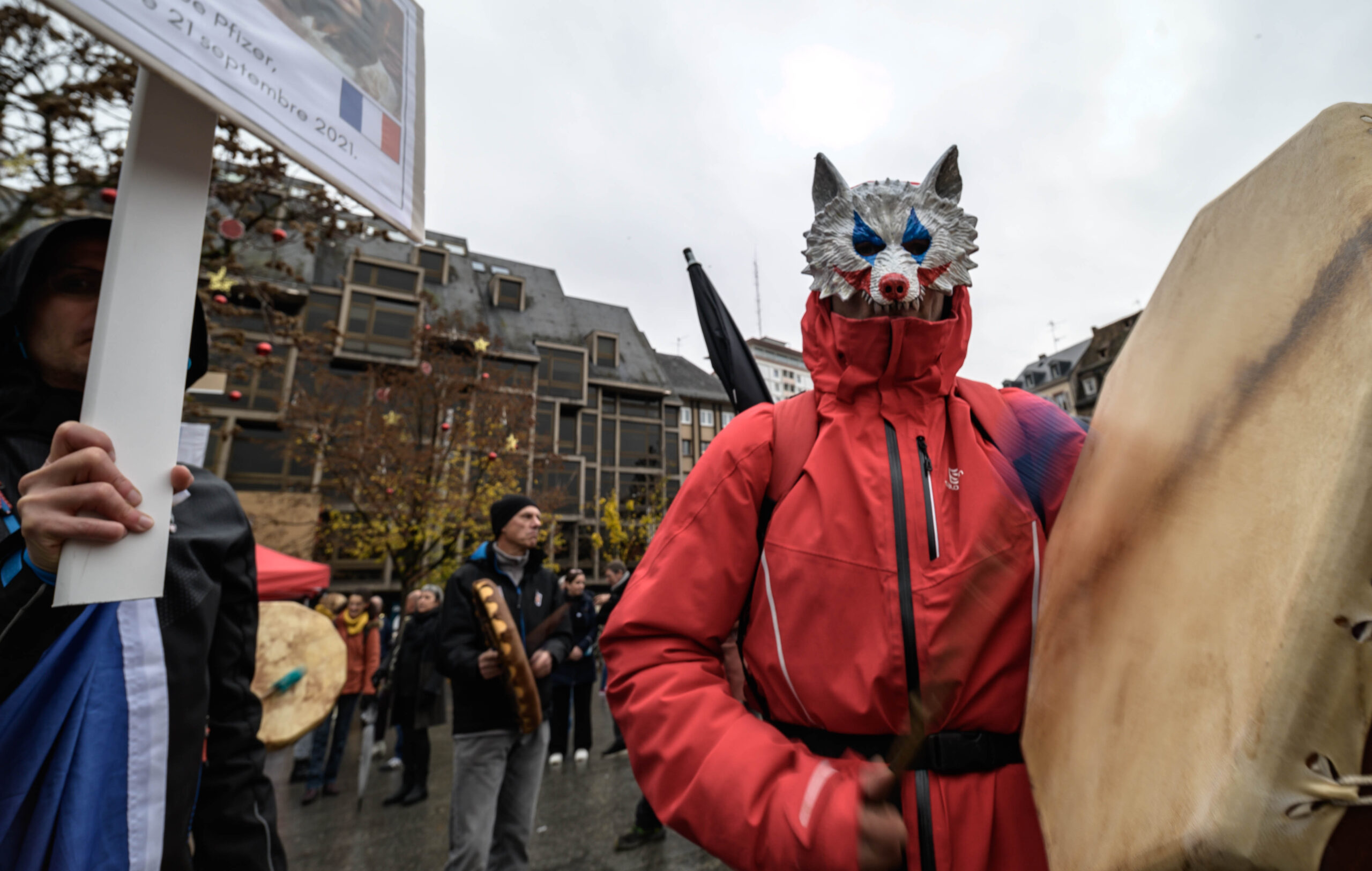
A masked protester is beating a large drum. Image: Pepijn Kouwenberg
At two O’clock, a group of white-masked people start performing a play. They are wearing signs that read ‘suspendue’, referring to the governmental measures that have suspended the public from participating in day to day life without being vaccinated. A narrator, symbolising the government, shouts french sentences across the square; ‘Vous êtes suspendue’ (Ed.:‘You have been suspended’), ‘Suspendue sans revenu’ (Ed.:‘Suspended without income’) or ‘Interdit de travailler’ (Ed.: ‘Forbidden to work’). Classical, dramatic music is playing in the background. After the play, the crowd applauds and makes noise for the speakers that join the stage. Amongst them is Tom Meers. During his speech, Meers sticks to the words that he is familiar with, remaining calm and thoughtful, but the messages of his crowd are far from being as nuanced.
- A protester dressed up as Death himself holds a syringe with up to eight vaccine shots indicating the amount of required injections will keep getting higher. Image: Pepijn Kouwenberg
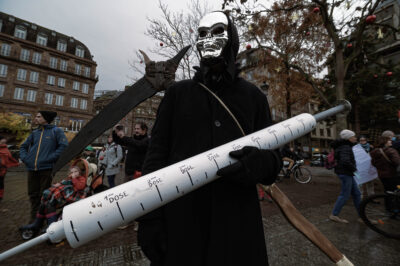
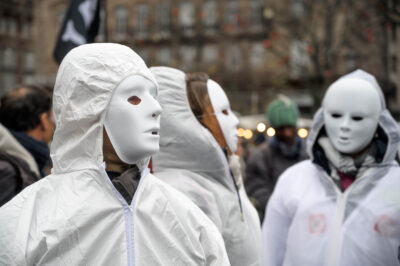
- A image of Macron as a cyborg was positioned underneath the statue on the main square.
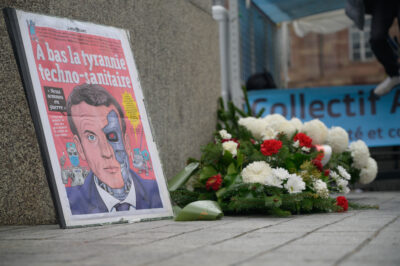
- A man disguises his identity behind the French flag Image: Pepijn Kouwenberg
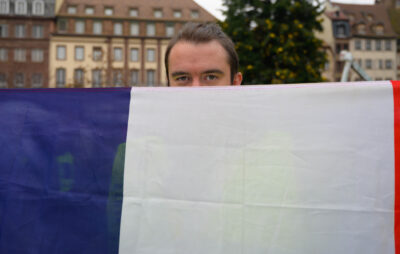
- Protesters perform a play in anonymised costumes Image: Pepijn Kouwenberg
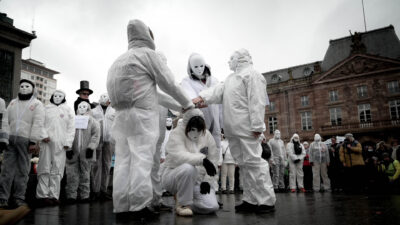
When the speeches are finished, the crowd starts moving towards Rue des Francs-Bourgeois, marching through the streets.
Fully-equipped police forces, around forty policemen and women, are guarding the streets that the mass is entering. The police carry tear gas- and riot equipment, but keep a large distance from the crowd. A van starts playing ‘La Marseillaise’, the French national anthem. A group of younger protesters form the front of the crowd, throwing smoke bombs in the direction of the police.
- A policeman block passage to one of the side streets guiding the protesters through the main street. Image Pepijn Kouwenberg
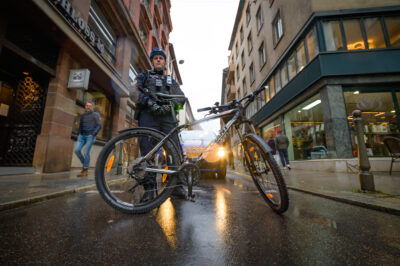
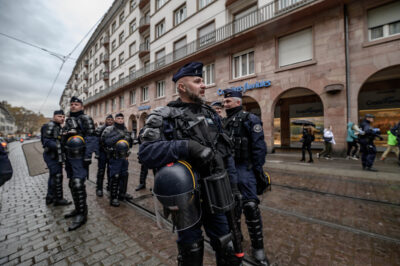
- Protester waving a flag in front of a building that ironically says ‘Vox’ the latin word for ‘voice’
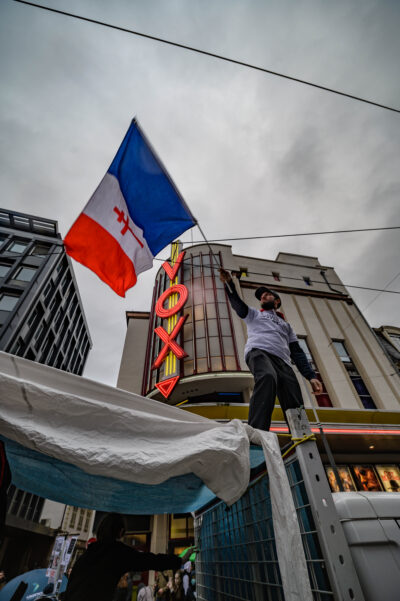
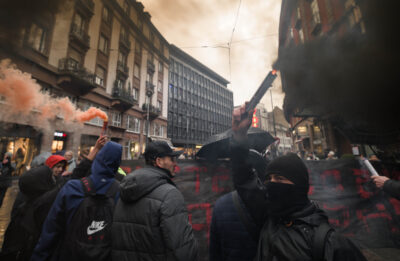
- A protester dressed up as Death himself holds a syringe with up to eight vaccine shots indicating the amount of required injections will keep getting higher. Image: Pepijn Kouwenberg

In our documentary series ‘Battling Brussels: Anti-Vax’, we dove into this topic even more.
You can watch it here.

